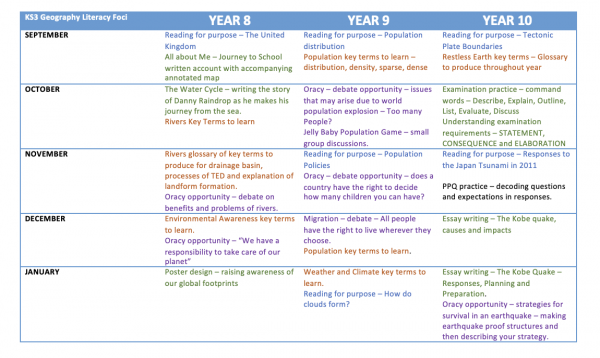Staff
Mrs S Woods-McAdam (Leader of Learning)
Mrs C Chisim
Ms L Campbell
Miss LA Lavery
Mrs T Warwick
Miss E Gilmore
Ms T McCracken
The Geography Department at the Belfast Model School for Girls is a progressive department having employed a highly effective strategy for using ICT, multi-media and audio learning and teaching within the subject content. Geography is regarded as a very valuable subject by employers (see more here). The nightly news is full of stories that involve Geography or need some understanding of Geography. The study of Geography is therefore a popular choice beyond Key Stage 3 with excellent results at GCSE and Advanced Levels.
At Key Stage 3, topics are themed by year group, beginning in Year 8 with investigations of the pupils’ own local environments with a focus on local mapskills, settlements, environmental awareness, rainforests and rivers and landscape processes. Field study is promoted within each year group and all Year 8 pupils usually have the opportunity to participate in a field trip to either the River Colin in West Belfast or the Giant’s Causeway.
In Year 9 pupils widen their geographical knowledge beyond their local area with investigations including ‘Into Europe’, weather and climate, tourism and population. The field study for this year group would be focused on local tourism. In the past this has been an open top city bus tour or a visit to Titanic, Belfast.
Year 10 is a crucial year for those hoping to study Geography at GCSE level with a focus on the Restless Earth, which give the students a clear understanding of what is expected at examination standard. Towards the end of the year the students will focus on Skills and Techniques. This includes statistical and graphical analysis as well as more traditional map reading. This ensures that all students have transferable skills whether they choose to continue with Geography or not beyond KS3. Pupils are taught from the CCEA GCSE Geography specification in preparation for those continuing their studies into Year 11.
Key Stage 4
The GCSE course is modular with a unit of study focusing on Physical Geography usually examined at the end of the Year 11 academic year – a continuation of topics started in Year 10. Also in year 11, students complete a field investigation within the local community to stimulate inquiry in preparation for their Unit 3 examination in Year 11 or 12. In total, by the end of Year 11, the students may have completed or prepared 60 % of their GCSE course. Year 12 completes the course with studies of Human Geography focusing on Population, Development and Settlement. To assist in learning, the Geography Department uses the novel approach of singing their GCSE notes to encourage learning as shown by these examples (Example 1) (Example 2).
Post-16
Advanced Level Geography is a two-year course at Key Stage 5. In Year 13, the students usually sit three modular examinations, both in the summer series. Physical Geography, Human Geography and Geographical Skills are examined. The AS course can be taken as a standalone course or as 40% of the full Advanced Level. The final year involves pupils undertaking a study of a Global Issue as part of a Human Geography module which also includes Ethnic Diversity and Population, followed by a Physical Geography module where the students study Tropical Ecosystems, Coastal Environments and apply their Decision-Making Skills. These modules make up the remaining 60% of the qualification.
In addition, the Geography department regularly offers the opportunity to participate in amazing national and international educational visits. This coming June 2024 we have a trip going to Italy to sample Italian culture and see volcanic activity! Previous trips include:
- Venice and Lake Garda.
- Krakow.
- San Francisco, Los Angeles, and New York.
- London.
- Iceland.






